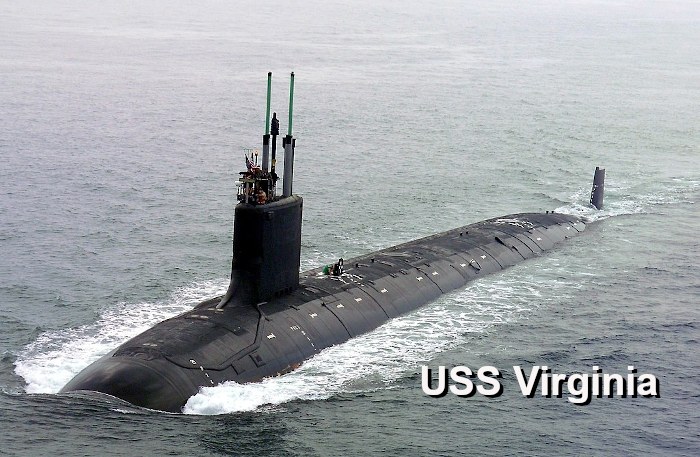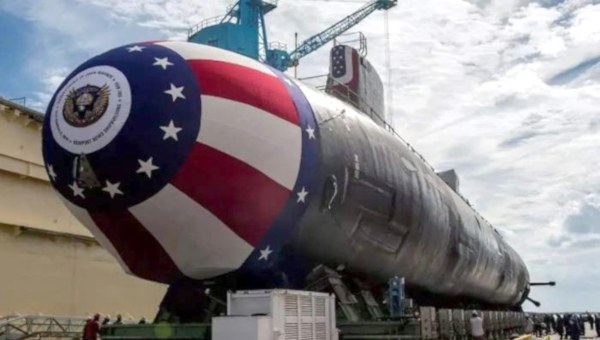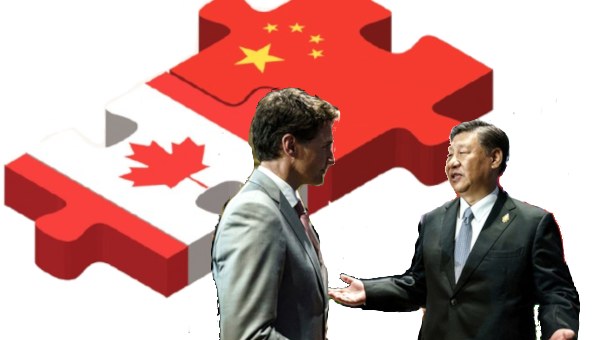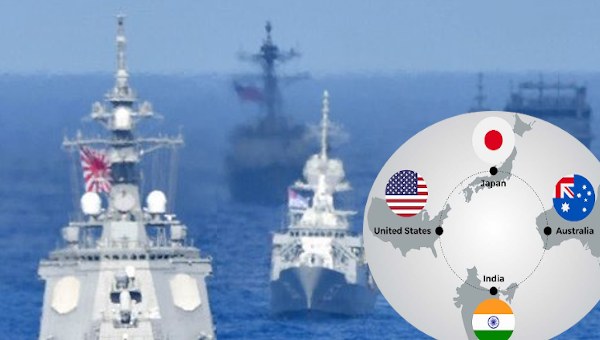The Dangerous Turn in the Arms Race in the Pacific
On 16 September 2021, the Prime Minister of Australia, the Prime Minister of the United Kingdom and the President of the United States of America, announced an enhanced trilateral security partnership between Australia, the UK and the US (AUKUS). This ‘security partnership’ includes Australia attaining at least eight nuclear-powered submarines and building these submarines in Adelaide. The new pact is a substantive uptick in the arms race unfolding across the Pacific and the American’s new cold war against China and its pivot to ring China with a range of US-led military bases, alliances and offensive capabilities. Anti-militarism, peace and solidarity groups across the region are organizing in opposition. It is incumbent that social movements in North America support these opposition movements.
The Nuclear Subs and the Australia-UK-US (AUKUS) Security Pact Fact Sheet
The French arms deal has already cost $2-billion (all denomination is AUS, except where noted). It was slated to cost about $90-billion to build and $145-billion to maintain over their life cycle. What compensation the French will demand is not clear. The nuclear submarines will be more expensive, but the Australian government has given no figures.
The Virginia class submarine, one of the possible US or UK contenders, presently costs $3.45-billion (US) per vessel (about $5-billion AUS). To this must be added the cost of upgrading the naval bases in Australia and the cost of running and maintaining the submarines. The US and the UK firms will make considerable profits from this deal.

Paying for the nuclear submarines and other commitments will be extraordinarily expensive and will mean that other departments will be raided to finance them. Welfare, education, the environment, and the important health budget will suffer. Workers’ wages, especially those in public service like nurses and teachers, will remain at an all-time low.
While military spending does create jobs, it does not create nearly as many jobs as a comparable investment in productive industry. The effect of increased military spending is to take resources out of creating products that expand economic activity and sink them instead into the creation of tools that destroy.
Questions about where to base the submarines, what new infrastructure will be needed, how maintenance will be conducted, how nuclear fuel will be handled, and how crews will be trained, and others – and how much all this will cost – need to be answered.
Trade
Our country cannot prosper without China by simply diversifying its exports. We are a resource exporter and will never be a serious manufacturer. Our economy is complementary to China’s, not to most OECD countries. Australia’s sales to China exceed the total of its next four biggest trading partners. China is not a customer to fall out with unless absolutely necessary.
We run a trade deficit with the USA because it doesn’t buy enough of what we sell.
India buys about $10-billion (US) of Australian exports each year versus over $100-billion (US) bought by China.
New Cold War
In the new cold war with China, we have opted to be in the front line. American war games suggest it cannot win a battle with China in the South or East China Sea. Yet, we have signed up for that possibility. The US and UK are two Anglo countries that can retreat from Asia if their strategy fails. Australia can’t.
The moves are a step back to the Cold War days and will bring with them increasing repression and restrictions on unions and other community organizations.
Since we have decided to integrate our navy with America’s and be its ally in confronting China, we should expect to be viewed as an extension of a nuclear superpower and be targeted accordingly.
Arms Race and Proliferation
The AUKUS agreement fuels dangerously spiraling arms races that must be reversed with common security diplomacy. It is pushing states not involved in AUKUS to strengthen military alliances with each other (e.g., India and France).
The transfer of highly enriched uranium and related technologies to Australia may well violate the Nuclear Non-proliferation Treaty and encourages nuclear weapons proliferation. It provides Australia with resources needed to become a nuclear power.
The Non-proliferation Treaty has a loophole allowing non-nuclear weapon states to remove fissile materials from international control for use in non-weapon military applications, specifically to fuel nuclear submarine reactors. To make these reactors as compact as possible, they are operated with nuclear-weapon-usable highly enriched uranium (HEU) fuel. With tons of weapons-grade uranium out of international safeguards, what could go wrong?
Russia could begin new naval reactor cooperation with China to boost China’s submarine capabilities in response to the AUKUS announcement.
India and Pakistan, which already have nuclear weapons, could benefit from international transfers as well, possibly from France and China respectively.
Iran has already expressed interest in enriching uranium to HEU levels to pursue a submarine program.
Threats
The increased military competition seriously undermines the possibility of US-Chinese and broader international cooperation to reverse the existential threats of nuclear weapons, the climate emergency, and pandemics.
The strategic competition between the great powers includes the danger of a great war which will destroy the planet.
Environmental Dangers
Nuclear-powered submarines present a risk to the environment and the people of Australia of accidents to the reactors and submarine collisions. There are already nine nuclear reactors on the sea floor from sunken nuclear submarines.
AUKUS may be a trojan horse for a nuclear power industry and even the adoption of nuclear weapons by Australia.
Military nuclear reactors in Australia would present a clear nuclear weapons proliferation risk and become potential sites for nuclear accidents and radiological contamination long into the future.
The small reactors used to power the submarines produce weapons-grade highly enriched uranium as waste. This would undermine global efforts to phase out the use of HEU because of WMD proliferation and security concerns.
The presence of these ships in our capital cities and harbours will be a clear and present danger. Is it prudent to build nuclear submarines in an urban setting of 1.3 million people? Green Party leader Adam Bandt has compared the move to putting “floating Chernobyls in the heart of Australia’s cities.”

Sovereignty
AUKUS places Australia on the front line of any future war with China. It drags us into a conflict that very likely will not serve our interests. And it says very clearly, between now and then: we have chosen America.
Whatever leverage Australia might have had between the two powers is gone. Australian Prime Minister Scott Morrison will agree to spend billions to lose that leverage on a submarine fleet that will be America’s and not ours.
How can Australia assert an independent and peaceful foreign policy with a military that is so integrated into the US? The AUKUS deal brings a further dramatic loss of Australian sovereignty and freedom of choice.
Since the Liberal Government – with no parliamentary or other discussion – has decided to integrate our navy with America’s and be its ally in confronting China, we should expect to be viewed as an extension of a nuclear superpower and be targeted accordingly.
UK peace groups point to four decommissioned radioactive Polaris submarines left to rust at Rosyth Dockyard fifteen miles from the centre of Edinburgh. This is what being part of the UK gives the people in Scotland – to be treated as trash, of no consequence, used as a dumping ground.
Anglo-Saxon Pact
Consortium News suggests that AUKUS “can be seen as a further indication of the nervousness in Washington, London and Canberra over the further decline of Anglo-Saxon power, which has dominated the world for the past four centuries…
“The writing is on the wall for the Anglo-Saxon powers, as it sees the world slipping through its fingers, prompting ever greater aggressiveness, rather than face economic and geo-political reality. Instead of seeking to peacefully join a multilateral world as equal partners, it is turning to ever greater military alliance to desperately try to hold onto its fading power.”
Hypocrisy
The three governments that have signed AUKUS are the same ones who have wrecked and decimated the Middle East for the last forty years.
The war on terror has caused around four million deaths and produced 37 million refugees as well as mountains of rubble. The women of Afghanistan have been left vulnerable and in danger after twenty years of war in that country. Yet, these governments now proclaim they are interested in the peace and stability of the region.
Tomahawk Missiles
The AUKUS deal includes the transfers of Tomahawk cruise missiles. Semi-formal rules have been agreed to with regards to missile transfers under the Missile Technology Control Regime. These rules include a “strong presumption of denial” for transfers of category 1 systems, which includes cruise missiles with a range greater than 300 kilometers; the Tomahawk has a range of at least 1,000 miles. This transfer will lessen the norm against missile-related transfers.
Under AUKUS, Australia will also buy Patriot missiles and possibly Trident missiles as well.
Regional Issues
Australia ratified the NPT in 1973, and it is also a signatory to the Treaty of Rarotonga (1985), or the South Pacific Nuclear-Free Zone Treaty. These commitments are essentially trashed by the AUKUS agreement.
The creation of this new military pact threatens security in the region and makes us complicit in dangerous regional tensions and conflict.
The AUKUS alliance has already begun to disrupt relations in the Indo-Pacific. Southeast Asia nations have expressed discontent at the alliance – Indonesia and Malaysia have expressed strong opposition.
Significant political and military figures in India, South Korea, and Japan are already asking why they have been denied these capabilities.
Global Issues
The alliance is causing fissures within the international diplomatic network. Announcement of the AUKUS alliance has disastrous global strategic ramifications. The Biden Administration has again acted without consulting its NATO allies. The alliance also fuels calls from European and E.U. leaders to create an independent European military superpower.
AUKUS has little to do with the defence of Australia. The aim is to make possible an Australian contribution to US battle plans against China which that country will view as profoundly threatening with implications also for war planning by Russia, North Korea, and other nuclear-armed states.
The new military alliance strengthens the worldwide arms race. •
- International Peace Bureau
- Asia Europe Peoples Forum – Peace and Security cluster
- Independent and Peaceful Australia Network
- Australian Anti Bases Campaign Coalition
- Campaign for Peace, Disarmament and Common Security
- Global Network Against Weapons & Nuclear Power in Space
- Guahan Coalition for Peace and Justice (Guam)
- Le Mouvement de la Paix (France)
- Veterans For Peace Chapter 113 Hawaii
- Peace Women Partners, Philippines
- Action for Sovereign Philippines
- I Hagan Famalao’an Guahan, Inc. (Guam)
- KILUSAN (Movement for National Democracy) Philippines
- KAISAKA (Unity of Women for Liberation) Philippines
- Maui Peace Action (Hawaii)
- Bukluran ng Manggagawang Pilipino (Solidarity of Filipino Workers/BMP) Philippines
- Committee for a Sane U.S.-China Policy (US)
- Philippine Women’s Network for Peace and Security
- Hawaiʻi Peace and Justice
- ʻOhana Koa / Nuclear Free and Independent Pacific
- Blue Banner Mongolia
- Initiatives for International Dialogue
- ALAB Katipunan (Philippines)
- Japan Asia Africa Latin America (Japan)
- MapaladKa Peace Movement (Philippines)
- Communist Party of Australia
- Malu ‘Aina Center For Non-violent Education & Action
- Dap-ayan ti Babba-I (North Luzon, Philippines)
- YouWin (Young Women’s Initiatives)
- Kauai Women’s Caucus (Hawai’i)

The AUKUS Pact is a Sign of a New Global Order
France is furious. Theresa May is worried. The announcement of the new Australia-UK-US alliance (AUKUS) and the ditching of a previous French-Australian submarine deal has led France’s foreign minister, Jean-Yves Le Drian, to term the pact “a stab in the back,” while the former British prime minister is concerned about Britain being dragged into a war over the future of Taiwan.
Oddly enough, Beijing’s reaction has been rather muted. Yes, it has accused the west of a “cold war mentality,” and Xi Jinping has warned foreigners not to interfere in the region, but its warning that China would “closely monitor the situation” was close to a “cut and paste” outrage.
AUKUS is more significant for what it reveals about the three partners’ thinking than the actual content of the pact. Some observers are calling it a “nuclear” deal when it is nothing of the sort; the submarines are not the nuclear weapon-carrying Tridents seen on the BBC drama Vigil, but vessels powered by nuclear energy, giving them longer range. For the west, AUKUS shows the real fear that the next president of the US might be either Donald Trump or one of his apostles. Boris Johnson has spoken in firm tones about AUKUS lasting for “decades”: the unstated implication is, regardless of who the presidents of the US are over that period, AUKUS is about binding the US into Asia-Pacific security for the long term.
Less obviously, it is also about binding the US into European security in a world where Nato may be less relevant. This week France has every reason to be angry about losing its Australian alliance and submarine contract. But over the next decade, expect to see a rather different arrangement: the UK and France will both be pillars of a European security order (along with a nascent EU force). And association with AUKUS brings the most important stabilising prize – the presence of the US allied firmly to a major European power (albeit a non-EU one).
China’s rhetoric about the cold war misses an important point: the structures of that era were binary and rigid. But AUKUS suggests that the liberal order can reconstitute itself through “minilateral” deals, in which different constellations of powers act together over different issues. The “Quad” of Japan, Australia, India and the US is the best-known example of this so far, but AUKUS may be a sign of more to come. Those deals may anger individual members of that order in the short term (British anger at the US over Afghanistan, French anger at Australia over AUKUS), but they actually show that the liberal order is more robust than surface noise suggests. It’s not a cold war, but a series of constantly changing adaptations.
Beijing seems to know this, which may be why its response has sounded so half-hearted. China will be less concerned about the specifics of AUKUS, as there is plenty of western military hardware in the region already. The real challenge to China is, why do so few of its neighbours back its complaints about the new pact? Singapore, a country that has spent decades balancing between the US and China in the region, expressed hopes that AUKUS would “complement the regional architecture,” which made it sound more like an elegant Georgian fireplace than a deal over deadly weapons. China’s failure over the past two decades has not been its failure to remove the US from the region, but its continuing inability to persuade local countries that American departure would be a good idea.
What is the AUKUS alliance and what are its implications?
The achilles heel of AUKUS may not be in security, but in a different area: trade. China is the biggest partner for all its neighbours and is outside only one major trading bloc in the region, the Comprehensive and Progressive Trans-Pacific Partnership. A British Foreign Policy Group report this week, which I co-authored, predicted that a move to join the CPTPP would be part of China’s strategy to improve the regional narrative around itself. The day after AUKUS was announced, Beijing declared its formal bid to join the partnership.
This is a smart move but also a risky one. The CPTPP demands a range of standards for trade and, crucially, labour, which are certainly weaker than EU rules but still more exacting than those in China itself. Beijing has heft, and may be able to negotiate its own terms more freely than smaller members. But its entry may well include discussions with what seems likely to be the partnership’s newest member in 2022 – the UK, which will be, after Japan, the second biggest economy in this grouping. If the UK can work out how to contribute to a process that moves China into higher standards of trade and labour rights, at the same time as keeping AUKUS alive, that would be a genuine contribution to the idea of “global Britain.”
It was Donald Trump who took the US out of the TPP, the pact’s predecessor. China’s attempt at entry might just tempt the Americans back in; which would mean that the greatest irony of AUKUS could be that the world’s two biggest economies become more divided on security, and simultaneously more thoroughly entwined through trade. •
This article first published on the The Guardian website.





